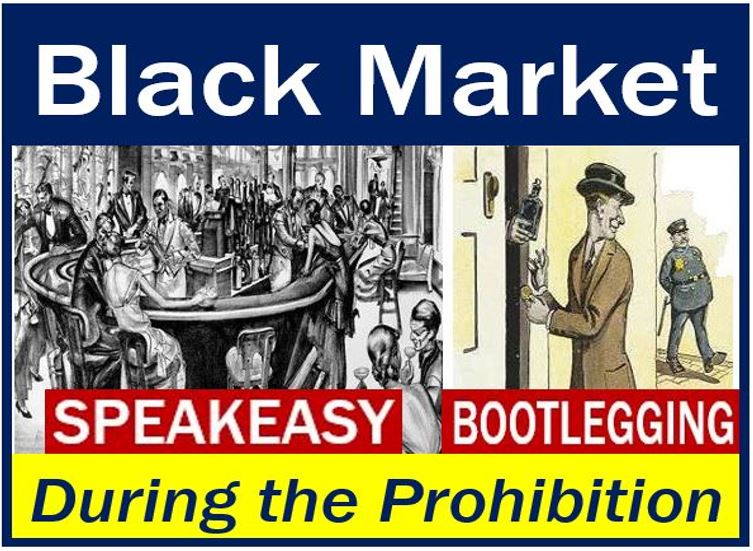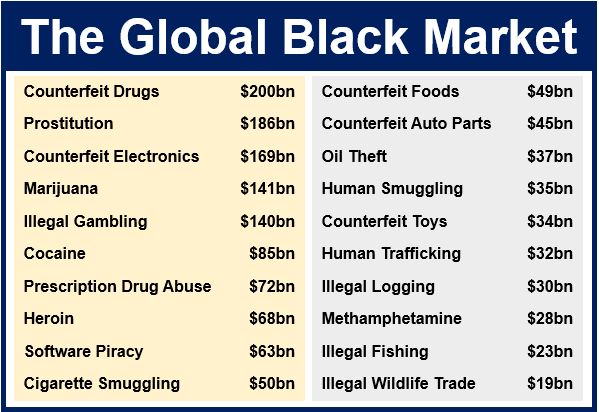Black market – definition and meaning
The Black Market, Underground Market, or Underground Economy is a market where people buy and sell products illegally. The term refers to the business activity rather than the products themselves. In fact, the products may be legal to own.
For example, smoking, buying, and selling cigarettes are legal. However, smuggling cigarettes from abroad and selling them without paying import duties is illegal. It is also illegal to buy those cigarettes.
As black marketeers work in illegal activities, the market operates outside the formal economy.
Black market – out of the limelight
We call it the ‘black’ market because business is conducted out of the limelight. In other words, the participants work in the dark; outside the radar of regulators and law enforcement.
Many seemingly innocent trades are, in fact, black market activities. For example, if I buy duty-free cigarettes and sell them to a friend, I am a black marketeer. Even selling chewing gum to friends at school forms part of the underground economy.

The underground economy also includes the buying of foreign currency at an unofficial rate. Additionally, smuggling and subsequently selling drugs and weapons are part of the underground market.
The informal sector
All these activities form part of the informal sector. Studies estimate that the global informal economy employs approximately 1.8 billion people.
There are several reasons why some people choose to trade illegally. Perhaps they want to avoid paying taxes and business rates or wish to circumvent trade embargoes. Additionally, they see an opportunity to make money when the Government imposes rationing.
Black market and the economy
The economy suffers because of black market business. It harms companies which produce and sell legitimate products. The government also loses tax revenue, and consumers are at risk from substandard goods.
According to Eurostat, including the black market in Italy’s GDP figures would result in a 2% higher total. GDP stands for gross domestic product.
The UK’s Office for National Statistics says prostitution and illegal drugs represent about 0.7% of the country’s GDP.
According to FT Lexicon, the black market is:
“The part of the economy involving illegal transactions. Also known as the underground economy.”
Black market term – brief history
We do know exactly when the term emerged in the English language. It likely became widely used during World War II (1939-1945), when many goods, especially foods, were rationed across the world.
This rationing led to the creation of black markets where scarce items could be bought and sold at high prices.
Some black marketeers became extremely wealthy during the Second World War. In England, Cockney mobster Billy Hill and his gang established a dominant position in the black market.
The History Learning Site writes the following about WWII Britain:
“The activities of German U-boats in the Atlantic greatly restricted the amount of food that came into the country. Therefore the government had to introduce rationing so that everyone got a fair share – primarily of food. However, this led to a gap in the market, which was filled by those involved in black market activities.”
According to the Online Etymology Dictionary, the term ‘black market’ appeared in 1931 with the meaning “unauthorized dealing in restricted or rationed commodities.” By 1935, it had become an adjective. The dictionary adds that the phrased became widespread when rationing began in World War II.
The black market – legislation
Lawmakers are forever torn between protecting their citizens and triggering a new problem. In other words, protecting people from the dangers of some goods and fueling the black market. Examples of potentially harmful goods are drugs and weapons.
If they pass laws that are too strict, the black market thrives. Dangerous gangs also emerge, and society suffers. In fact, this is what happened during The Prohibition in the United States (1920-1933). During The Prohibition, the Government banned alcoholic drinks.
However, if lawmakers went too far in the other direction, what would the consequences be? What would happen if we legalized everything?
Would we end up with virtually no forests? Would hateful practices like child sex slavery thrive, and what about drug addiction?
According to Interpol, black market criminals often sell dangerous goods “with a complete disregard for the health and safety of consumers.” In fact, the phenomenon has grown to an alarming level.
The black market today poses “tremendous risks to society in the global economy,” says Interpol.
Black market & organized crime
Law enforcement agencies say there is a clear link between the trafficking of illegal goods and transnational organized crime.
The enormous profits attract Mafia-like groups. Criminal organizations make billions trading legitimate goods through illicit channels or selling illegal products.
Criminal networks exploit new technologies and differences among national regulatory regimes. They also exploit the links between global economic, transportation, and finance systems.
Their profits fund other criminal activities. For example, they finance people smuggling, drug trafficking, kidnapping, and robbery.

Black markets were enormous in the old Soviet Union, Eastern European, modern Cuba, and North Korea. In other words, wherever there is a communist dictatorship, the underground economy is huge.
In fact, anywhere where rationing is imposed on the population, black markets thrive.
Video – What is the Black Market?
This video presentation, from our YouTube partner channel – Marketing Business Network, explains what the ‘Black Market’ is using simple and easy-to-understand language and examples.

